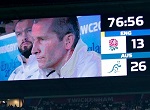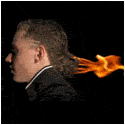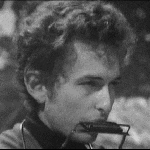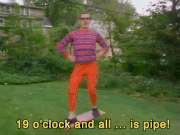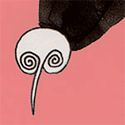|
For some reason I'm completely blanking on this, if I'm in F# minor, and I see an F# (as in F with the accidental) that means play a G? Or just an F#, and a double sharp would make it G?
|
|
|
|

|
| # ? Jun 12, 2024 18:34 |
|
Can you post an example? I think I understand you, but just in case. If you see a regular # it's probably just a courtesy accidental, meaning that in the previous measure there was an F natural so they stuck the sharp back in the next measure just to make sure you know to go back to F#. Double-sharp would mean G. Typos abound in music with lots of sharps/flats, though, so if it sounds horrible maybe it is meant to be a double-sharp.
|
|
|
|
Hawkgirl posted:Can you post an example? I think I understand you, but just in case. If you see a regular # it's probably just a courtesy accidental, meaning that in the previous measure there was an F natural so they stuck the sharp back in the next measure just to make sure you know to go back to F#. Double-sharp would mean G. Typos abound in music with lots of sharps/flats, though, so if it sounds horrible maybe it is meant to be a double-sharp. Yeah I guess it was that, I think they must have put it in because Bach was being so liberal with adding in E#s. It's in the 6th measure from the F#m prelude in book 2.
|
|
|
|
Ya it is incorrect to notate an F double sharp with a # in a key signature with F#. Accidentals always override a key signature, they are never combined.
|
|
|
|
I just started taking lessons a few weeks ago and I'm enjoying it so far. I should have shopped around for an instructor because piano is not my instructor's main instrument. He teaches a variety of instruments mostly to kids. Should I consider finding a new teacher or is it early enough in my training I shouldn't worry about it? He's a nice guy but I'm mostly worried about starting bad habits that he might not catch. Also I'm working on an exercise to practice stretching 4th and 5th fingers. As I go up the keyboard with fingers 1 2 3 4 5, I noticed that when I use my 4th and 5th fingers my thumb usually sticks up off the keyboard. Is this OK or should I focus on keeping my thumb on/close to the keys?
|
|
|
|
Bounded Empire posted:I just started taking lessons a few weeks ago and I'm enjoying it so far. I should have shopped around for an instructor because piano is not my instructor's main instrument. He teaches a variety of instruments mostly to kids. Should I consider finding a new teacher or is it early enough in my training I shouldn't worry about it? He's a nice guy but I'm mostly worried about starting bad habits that he might not catch. No, the earlier in your training the MORE important it is to have a really good teacher in your specific instrument. This is when habits get ingrained, good or bad! In general your hand position should be something like it would be if you were holding a ball or a bubble in your hand. Fingers curled in, write neutral, as relaxed as possible.
|
|
|
|
I couldn't get into piano class this quarter because it was full, so I'll probably be asking stupid questions in this thread instead. Apologies in advance. Q1: how am I supposed to play the left hand first half of this line? The only way I can think of is to hold c3 with the pinkie and play c4/e4 with the thumb, but that doesn't sound smooth at all. 
|
|
|
|
Use the pedal? I mean that's what I'd do since I can only reach a 9th anyway.
|
|
|
|
Janin posted:I couldn't get into piano class this quarter because it was full, so I'll probably be asking stupid questions in this thread instead. Apologies in advance. No way to play that without cheating somewhere, unless of course a 10th is comfortable for you.
|
|
|
|
Does anyone have a recommendation for a decent digital piano for classical music? Before you point and laugh and condescendingly pat me on the head (which I totally deserve), I should explain my situation. I recently moved across country to a non-first floor apartment in New York, and I had to give up my childhood upright in the move. I keep weird hours, and I'm looking for something that at least resembles a real piano so I don't totally lose my technique while also not pissing off my neighbors at 1 in the morning (yay thin walls!) Am I trying to live in a land of fairies and unicorns, or does something like that actually exist? Assume I have no budget constraints, and don't think too hard about why I live in an apartment with thin walls if that's the case
|
|
|
|
Anyone got any advice for getting good at reading sheet music? Something a bit beyond "just practice", wonder if there are techniques people use to help them or something. Basically I'm still woeful at reading the notes and it makes learning pieces very time consuming and difficult, despite trying for a long time to get better at it it's really slow progress
|
|
|
|
Paperhouse posted:Anyone got any advice for getting good at reading sheet music? Something a bit beyond "just practice", wonder if there are techniques people use to help them or something. Basically I'm still woeful at reading the notes and it makes learning pieces very time consuming and difficult, despite trying for a long time to get better at it it's really slow progress How much music theory do you know? It gets easier if you can recognise a C-major chord or an E-minor arpeggio. Think of it like reading; you're not looking at each individual letter and working out how it sounds, then putting them together for a word. You just see the word and you know how it sounds; it's the same thing with music. When I'm sight reading I can usually see chords rather than individual notes, which means I can read faster. I think most people struggle with sight-reading difficult pieces of music, really the more pieces you sight-read the better you'll get.
|
|
|
|
Paperhouse posted:Anyone got any advice for getting good at reading sheet music? Something a bit beyond "just practice", wonder if there are techniques people use to help them or something. Basically I'm still woeful at reading the notes and it makes learning pieces very time consuming and difficult, despite trying for a long time to get better at it it's really slow progress Are you talking about simply reading notes - like looking at a note and figuring out that it's a D - or sight-reading while playing? If it's the former, there are tons of written exercises/workbooks to help you get better at reading notes/notation. Every formally-taught student goes through written exercises to learn notation and theory.
|
|
|
|
If it is just trouble identifying note = D or half note or C# or whatever, read easier pieces, and read a lot of them. There are these books called sightsinging books - I even found a free one googling: http://www.lightandmatter.com/sight/sight.html - that I think would be really helpful. Short melodies, bass clef and treble clef, no having to play hands together. Yeah, it's supposed to be for singing and ear training, but there's no reason why you can't use them to practice piano. If you can read these through, then grab a book of easy piano music and start trying to read pieces hands separately, then together.
|
|
|
|
Ponchitta posted:Does anyone have a recommendation for a decent digital piano for classical music? Before you point and laugh and condescendingly pat me on the head (which I totally deserve), I should explain my situation. I was pretty happy with my Yamaha DGX-630B 88-key Clavinova when I lived in a small apartment in Chicago. Basically you want something with weighted keys, so just look for Clavinovas.
|
|
|
|
Paperhouse posted:Anyone got any advice for getting good at reading sheet music? Something a bit beyond "just practice", wonder if there are techniques people use to help them or something. Basically I'm still woeful at reading the notes and it makes learning pieces very time consuming and difficult, despite trying for a long time to get better at it it's really slow progress Sight-reading is a skill that has more than just one component, and it would be helpful to think of it this way. It's really a series of skills. The best analogy is reading a language - once you learn the alphabet of some language, in theory you can spell out any word that you read and know what it sounds like, but it's incredibly inefficient and wasteful. The goal is learn the words and grammar of music which makes the whole reading process much easier. Your difficulties might not be due to any lack of ability, but simply that you don't know the language of music well enough yet so you're reading is bound to be super slow (hence why other people are asking about your knowledge of theory.) I'm going to start by saying that to improve at sight-reading, you really should work on it a little each day or each time your practice. The practice really is indispensable. Ideally, just sight read a lot of very small and very easy pieces. Don't be afraid to make it super easy, and play as slow as you need to be accurate. You should take your time and play the correct notes, slowing down where needed. But there is a lot more to the story. To get an idea of the language of music, consider rhythmic patterns. You need to already have in your visual memory what certain rhythmic patterns look like, and furthermore, what rhythm that pattern corresponds to aurally (i.e., in sound). That way when you see a certain rhythmic arrangement of notes (say, a dotted quarter, then an 8th note) you won't have to pause and try to remember what that rhythm sounds like, you will play the rhythm correctly automatically. Of course, there are also the notes, the articulations, and so on. You will acquire these things over time by sight-reading a lot of music, but studying them independently can produce the same or even better results. You can find theory books that have just the raw rhythmic patterns for study, and you can clap them and count them out loud to associate what they look like with what they sound like. The 'language' of music includes: 1) Scales, chord progressions, arpeggios - these occur over and over again in pretty much all music, and while learning them all is a feat, it should be the eventual goal of any serious piano player to learn at least the 4 major white keys (C, G, D, A) and a thing or two about minor keys. There are lots of books out there that contain all of these. 2) Rhythmic motiffs and patterns - contrary to what you might think, there are only a limited number of these that occur over and over again, with only very infrequent exceptions. You can study these independently and clap/count them out loud until you get an idea what they sound like. 3) Intervals, both for melody and chords - knowing what a sixth looks like on the page as a chord or two notes in a row. Pretty much the only ones you need to know are 2nds to an octave. For a 5th, it's two lines up for a line note, and two spaces up for a space note - this is a distinct visual pattern, and there is one for all of those intervals. Once you know these, you can almost ditch just reading the notes. 4) Theoretical structure - over time playing more and more music, you will start to get a good sense of how something should go or sound, and you will hopefully at some point get some instruction on this as well. Certain things are used in almost all music, such as the 4th and 5th notes of a scale being used for harmony, especially the dominant seventh (4-note) chord of the 5th note. 5) The actual notes. For me, the whole EGBDF and so on works horribly for me. I've always had trouble with sight reading and it's way behind my other piano abilities, and I can sometimes stare at a note for 10 seconds before recognizing it. I've done tons of notespeller books and I just seem to be naturally weak in this area. Fortunately all of the other knowledge I have lets me site read somewhat OK despite this horrid weakness. Basically, the last thing you want to see when reading music is a bunch of black dots that you have to spend mental energy and minutes to sort out, before playing one note. You should already have practiced and studied the building blocks of music and it's rare you will run into anything that will throw you off or won't be covered by these basics. Once you've learned these things it will literally change what you see, just like that picture with a vase and two faces - knowledge can really change what you are looking at (aka someone telling you there is a face or a vase.) Speaking of sight reading, one thing I like to do is download the scores of music from some of my favorite works and try to follow along with the score while I listen to a recording. The Busoni Piano Concerto is a fun one to download and read while listening to a recording (or the live performance: http://www.youtube.com/watch?v=-rFV_g6T5lM&list=PL32E8AC976D6FEB11&feature=plpp_play_all). This one is fun because of how hilariously hard it is, and you get to watch the fireworks with the live performance. http://i.imgur.com/HN1Uf.jpg CowOnCrack fucked around with this message at 09:15 on Nov 30, 2011 |
|
|
|
Thanks for all the replies, they're much appreciated. I think I'm definitely going to go back to basics, I used to have lessons but we never did that much theory or sight reading practice because I would basically say I WANNA PLAY THIS and my teacher would help me to do it. It means that what I can actually play is well beyond how well I can read so there's a disparity and I guess I'm trying to run before I can walk a bit. I'll get some really simple sight reading books and work through them I think
|
|
|
|
CowOnCrack posted:The 'language' of music includes: This is a really good point. Great post in general, in fact. This got me thinking -- maybe practice sight-reading from etude books? Different etude pieces focus on different things -- e.g., one might focus on broken chords and another may focus on tricky rhythm -- but all of them usually have some sort of focus. Maybe you can abuse this to help you get used to sightreading these patterns?
|
|
|
|
facepalmolive posted:This is a really good point. Great post in general, in fact. This got me thinking -- maybe practice sight-reading from etude books? Different etude pieces focus on different things -- e.g., one might focus on broken chords and another may focus on tricky rhythm -- but all of them usually have some sort of focus. Maybe you can abuse this to help you get used to sightreading these patterns? Yea, there are lots of great books out there for this. USA Neil A. Kjos Music Library Kieth Snell: Piano Repertoire, Baroque and Classical (Level One) Kieth Snell: Piano Repertoire, Romantic and Modern (Level One) Kieth Snell: Piano Repertoire, Etudes (Level One) Alfred Piano Library Selections from Anna Magdalena's Notebook, Alfred Masterwork CD Edition Canada Royal Conservatory of Music Celebration Series Perspectives, Repertoire (Level One) Celebration Series Perspectives, Etudes (Level One) It's quite normal for your sight reading to lag somewhat behind what you can learn and play. If you can play level 6-7 stuff from the RCM books (late intermediate), then it's normal to sight read at about level 2 to 3-ish (middle beginner). Some people were taught to pretty much always sight read at the level of their play - in other words, they are constantly reading from their music to play new stuff. But for many players like myself, my sight reading is way behind because it's very difficult for me and it's possible to learn much harder pieces by simply reading slowly and then speeding it up in muscle memory, despite the fact that it takes a lot more time. Even though I can play some beginning/middle intermediate stuff, I can barely sight read level one material. But sooner or later you just gotta do it, and it will pay dividends in the long run because learning repertoire at the mid intermediate level and beyond will become horribly inefficient without these skills. Sight reading is actually helpful for technique, because you will have a much more comprehensive understanding of the music you are playing. There are at least these four components to knowing a piece: 1) Having a visual memory of the piece (being able to visualize the notes on a page, and visualize the keys on the keyboard), 2) Having an aural memory of the piece (the sounds of the pitches, the sound of the rhythm), 3) Having the piece committed to muscle memory, and 4) Having the piece musically analyzed (knowing the structure of the piece which can be learned by studying theory). Some people tend to rely exclusively on one memory method, or in my case, two - audio and muscle. Knowing the piece in all four ways will allow you to play much more difficult pieces from memory than would otherwise be possible, and play them much better because your understanding of them will truly be complete. If all you have is your muscle memory or audio memory, it's easy to draw a blank or get totally lost when your fingers don't remember what to do. Fine motor muscle memory in particular is one of the most finnicky things in the world. CowOnCrack fucked around with this message at 22:21 on Nov 30, 2011 |
|
|
|
Also, there are theory books which deal just with the raw building blocks. The Neil A. Kjos Music Company has a set of theory books called Fundamentals of Piano Theory by Kieth Snell and Martha Ashleigh. I think at least a basic knowledge of theory is a must for all piano players. For piano players specializing in being pianists and improving their technique, there is probably a point in theory where you don't really need to go further. Of course, if you are interested in composing as well as playing, then you should take the theory as far as you can.
|
|
|
|
Thanks for the suggestion - I read up a bit on these and just picked up the last boxset on Amazon at $50 for all of the levels. I look forward to these!
|
|
|
|
Incredulous Dylan posted:Thanks for the suggestion - I read up a bit on these and just picked up the last boxset on Amazon at $50 for all of the levels. I look forward to these! Those Keith Snell ones are pretty nice because each book repeats the important stuff from the level before, and everything builds on what you already know. The level one book is probably the hardest because you are learning some building blocks from scratch, but from there it just gets easier. I recommend that if you work through the books, try to do everything even though you will repeat some stuff from level to level. There is some stuff that is worth doing over and over until it's second nature, like the circle of fifths and key signatures. It may get tiresome to write out the I, IV, and V chords for every key over and over, but this stuff will pay huge dividends once you've got it down. Those theory books also have lots of excerpts and even small pieces in them, perfect for site reading. If there are excerpt examples try to play them on the piano, sing them, or at least clap them out loud. For the ear training parts, you will need a second person to play random notes while you guess them. Ear training is really a wonderful thing because if you aren't naturally gifted at the aural part, this will get you to the point where you can play by ear and hear music just by reading it. You will eventually learn what a different intervals sound like (a 2nd, or 4th, for example) what pitches correspond to which notes, what triads sound like, then seventh chords, etc. You can base it on tunes you might already know, like this: Intervals: (do - C, re - D, mi - E, fa - F, sol - G, la - A, si - B) 2nd - Happy Birthday (do, do, re, do, fa, mi!) (Hap - py BIRTH - day) 3rd - Oh When the Saints (do, mi, fa, sol, do, mi, fa, sol) (Oh WHEN) 4th - Auld Lang Syne (do, fa) (Should OLD) 5th - Twinkle Twinkle Little Star (do, do, sol, sol) (Twin - kle TWIN - KLE) 6th - My Bonnie Lies Over the Ocean (do, la!) (My BONNIE) 7th - ? don't know a good one (do, si!) 8va (octave) - Somewhere, Over the Rainbow (do, do!) (Some WHERE) CowOnCrack fucked around with this message at 08:49 on Dec 1, 2011 |
|
|
|
CowOnCrack posted:You can base it on tunes you might already know, like this: edit: no wait, that's an augmented 4th. Thinking... Pure Imagination (Come with me, and you'll be, in a WORLD of pure imagination) It's hard because it's LA DO SOL, LA DO SOL, LA DO TIII... so it's hard to lock onto where DO is. Major seventh is between a (DO) and world (TI). Sorry for being dumb. Erwin fucked around with this message at 18:23 on Dec 1, 2011 |
|
|
|
Erwin posted:
"Take On Me" (by aha) is an easily memorable one for the major seventh.
|
|
|
|
I always used the Star Wars theme for a fifth. Nerd. Does anyone else suffer from sweaty palms when playing? I don't usually have a problem except during recitals but it's been bugging the poo poo out of me lately. I tried putting antipersperant on my hands but it just made them sticky. Maybe I could pop an ativan right before or something. But then I might fall asleep on the piano or something.
|
|
|
|
Bob Shadycharacter posted:I always used the Star Wars theme for a fifth. Nerd. This happens to me occasionally, and I don't really know what you can do about it. If you have any moisture at all on your hands it makes playing almost impossible. Those black keys are slippery enough already!
|
|
|
|
CowOnCrack posted:This happens to me occasionally, and I don't really know what you can do about it. If you have any moisture at all on your hands it makes playing almost impossible. Those black keys are slippery enough already! Seriously, it's like trying to wrestle a greased pig. The guy who has lessons before me puts baby powder all over the place. I guess I could try that. Seems like it would get gross too though, especially if you just kept sweating and it turned into a paste of sadness.
|
|
|
|
Alright, getting back into the swing of things with piano. Thanks for this thread, already a great resource. I'm amazed that I can jump around and play things without looking at the keys. It's fascinating that my hands can navigate the piano by touch when there aren't many "landmarks" to go by. I'm going to start making this mandatory for my practice and learning so that I can keep my eyes on the music more than I presently do. I'm afraid that I'm memorizing pieces and will not be able to sight read as well as a result. Does this make sense, or should I not be too shy about looking at the keys just starting out? Also: is it uncouth for me to hit black keys with my thumb? There are some F# octaves that I am playing right now (not simultaneously, but two F# eighth notes in a row, an octave apart) that I naturally want to use my thumb on. My teacher four years ago said not to hit black keys with my thumbs, however this was a very basic course I took, too.
|
|
|
|
As you memorize more complicated pieces, you'll be able to sight read easier as well. Where you focus depends on whether you want to play by yourself or with others. If you want to play with other people work on your sight reading so that you'll be able to pick up new songs more quickly. As far as the no thumbs on black keys thing, I've never heard of it, although I haven't taken lessons in a while. I can think of several classical songs off the top of my head that start with your thumb on a black key.
|
|
|
|
|
It's a good rule mainly because when you're doing runs or similar scale-type things you end up twisting your hand a bit to get the thumb on the key, which can slow things down. Using your thumb on black keys for octaves or other large intervals should be fine.
|
|
|
|
Kolodny posted:It's a good rule mainly because when you're doing runs or similar scale-type things you end up twisting your hand a bit to get the thumb on the key, which can slow things down. Using your thumb on black keys for octaves or other large intervals should be fine. Excellent, thanks all. I'll take the approach of "avoid doing it unless it genuinely is the easiest/best way to do it."
|
|
|
|
Oh, I wasn't realizing you were talking about doing scales. Don't start a scale on a black key with your thumb.
|
|
|
|
|
19 o'clock posted:Alright, getting back into the swing of things with piano. Thanks for this thread, already a great resource. Playing without looking at keys isn't really that useful of a skill overall IMO, in that you shouldn't go out of your way to try and practice that. You will gradually pick that up naturally just from the normal course of learning piano and sightreading and all, so that should really be enough. As for thumbs on black keys, "avoid doing it unless it genuinely is the easiest/best way to do it" is a good approach to go. Remember that everything teachers tell you are more guidelines than hard-and-fast rules.
|
|
|
|
TheBeardedCrazy posted:Oh, I wasn't realizing you were talking about doing scales. Don't start a scale on a black key with your thumb. No, not in scales. All my scale learning has always been with fingers hitting black keys, not thumbs, so that's fine. It's just attacking certain pieces where it only makes sense to me, after thinking about it a minute or two, to hit an accidental with my thumb. facepalmolive posted:Playing without looking at keys isn't really that useful of a skill overall IMO, in that you shouldn't go out of your way to try and practice that. You will gradually pick that up naturally just from the normal course of learning piano and sightreading and all, so that should really be enough. Excellent, thanks. It's good to know I shouldn't be down on myself for watching my hands and keys as I learn this stuff.
|
|
|
|
I think playing without looking is a good skill to have. For one thing, even if you can memorize everything you can't memorize everything before you start playing it and for another, even if you're looking at the keyboard you probably can't look at every note at once. I can't, anyway. That said, I think playing without really looking sort of comes naturally because you kinda have to do it if you ever read music at all.
|
|
|
|
I wouldn't worry about "practicing" not looking at the keys. Also there is no rule or guideline for not using your thumb on black keys. Of course you will use your thumb on black keys. Hell, play a Db+ Major triad or f# minor. There you go. The key with fingering is to be consistent, and especially if you have no clue what you're doing, use the fingering given in the score. When you have played for a little while, you can start using your own fingering, but coming up with better fingering than a good edition of a score is a difficult task.
|
|
|
|
Which version of the Well-Tempered Clavier would you guys recommend getting? The Schirmer's version seems to have some pretty bad reviews, how's this one?: http://www.amazon.com/Well-Tempered-Clavier-Books-Complete-Dover/dp/0486245322/ref=sr_1_2?ie=UTF8&qid=1323315761&sr=8-2
|
|
|
|
Henle usually prints out great editions -- especially for things like Bach, where crappy editors try to 'improve' on pieces with their own changes or additions (edit: or because Bach's stuff is so old that through making hand copies of copies of copies, errors are bound to crop up somewhere). I think Henle usually stays as close to the original as possible, and I want to say they're pretty good about doing their homework and separating out the wheat from the chaff. Their noteheads are at a good distance and very easy to read. Their music is just great overall. The only thing that sucks about Henle is the hefty price tag. Anything published by Dover (like the one you linked) is usually also pretty good edition-wise, and much, much more affordable -- I think they take good old editions with expired copyright/patent/whatever things and reprint them. My only complaint with Dover is that their notehead font sucks, and the notes are usually somewhat cramped together and less comfortable to read. Schirmer usually blows goats. Their editors well... are really editors. As in they edit the original music. vvvvv Bunch of publishers offer Urtext editions. You most likely had a Henle Urtext (as I mentioned above) or Wiener Urtext V  V V
facepalmolive fucked around with this message at 06:26 on Dec 8, 2011 |
|
|
|
For no specific reason, Urtext. It's what I have and it's done pretty well, though I don't really have experience with other editions. ^^ Good to know! Kolodny fucked around with this message at 21:32 on Dec 8, 2011 |
|
|
|

|
| # ? Jun 12, 2024 18:34 |
|
Urtext.
|
|
|










